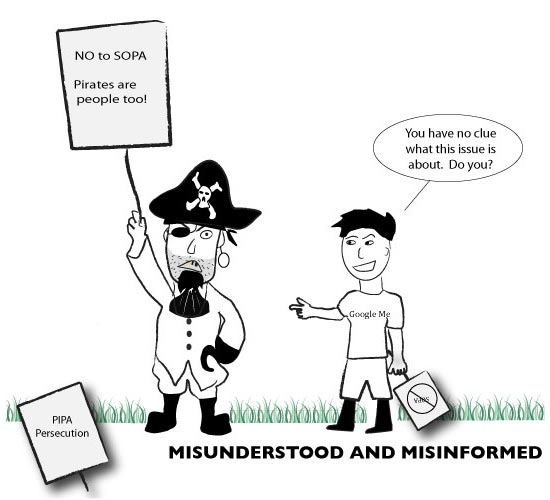EDITORIAL: Public voice heard loud and clear via social media

“Stop SOPA! Down with PIPA!” That’s all the fury right now. We can’t turn on the news or go to a favorite search engine without hearing about the SOPA/ PIPA legislation or seeing a stance being taken on a web page.
What are SOPA and PIPA? SOPA, Stop Online Piracy Act, was sponsored and written by legislators in the House of Representatives, and PIPA, Protect IP Act, is the corresponding bill in the Senate. Both were written to try to curb online theft, and the copying and sale of copyrighted works. They are defined as laws that will fight online trafficking of copyrighted intellectual property and counterfeit goods.
These bills are supported primarily by the entertainment industry. It has been with their backing that these bills were almost passed with no resistance. However, the Internet giants quickly learned of the legislation and were vehemently opposed to it.
Ultimately, backing for SOPA was temporarily halted after tremendous outcry poured forth due to overwhelming dissuasion spear-headed by such powerhouses as Google, Wikipedia and WordPress. PIPA has been put on the back-burner indefinitely.
What does that mean? It means that we—the people—spoke and our representatives actually listened. We spoke through social media sites such as Google, Facebook and Twitter, and declared our outrage at these bills.
Does this mean that the public advocates online piracy? Of course not. Does this mean that the bills and the intentions behind them were wrong, and that we should not support attempts to keep online intellectual properties safe? No.
It simply means that as a whole, the majority of the American public believed SOPA and PIPA were the wrong way to go about affecting the change. There is already a very good system in place called the Digital Millennium Copyright Act (DMCA) which has different subtitles for each media.
Title II of this act is the Online Copyright Infringement Act and is defined as copyrighted material caught being posted on the web by the owner of said material. It can be removed once the owner of the material sends a message to the host of the website with proof that they are the correct owner of the material. The ‘stolen’ material is then removed or if not then the owner of the material has the right to go to court.
Granted, all systems have flaws and nothing works perfectly. But why did the entertainment industry feel the need to change the current system? What did they think the new bills were going to accomplish that the existing one did not.
What had the online community so upset was the shifty way the entertainment industry attempted to sneak these bills through legislation. As stated in the Jan. 18, 2012, issue of the NY Times, “Heavyweights like the Walt Disney Company secured the support of senators and representatives before the web companies were even aware the legislation existed.”
In response, the public saw such drastic actions as the Jan. 18 Blackout Day of protest. And while many accuse the sites of over-reacting and pulling a ‘Chicken Little’ routine, the extreme actions did force our representative to pull back and re-think their positions and the bill, at least for now.
So, what is the next best course of action? Let things lie? Introduce the bills again although slightly re-worked? Vint Cerf, one of the founding fathers of the Internet, and Google spokesperson Samantha Smith both suggest a “follow the money approach.” This approach is exactly what it sounds like—find where the money is coming from that funds the illegal piracy, follow it back to the source and stop it there.
Will the Recording Industry Association of America (RIAA) and the Motion Picture Association of America (MPAA) be satisfied with that approach? Or will they continue to push for these bills to come back?
As a public, we made our voices heard in a way that in this day and time is quite rare. What happens next is entirely in our hands, as our generation continues to make our social medias work for us to affect change and make our voices heard in our own way.


[…] • EDITORIAL: Public voice heard loud and clear via social media by The Signal Staff […]